The New Republic
Address by Brendan Corish, T.D., Leader of the Labour Party
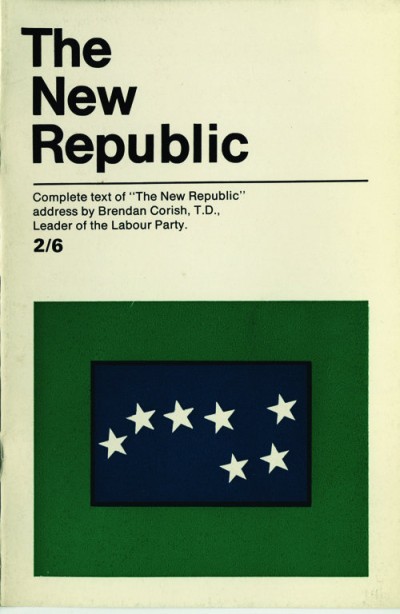
| Date: | February 1968 |
|---|---|
| Organisation: | Labour |
| Author: | Brendan Corish |
| View: | View Document |
| Discuss: | Comments on this document |
| Subjects: |
Please note: The Irish Left Archive is provided as a non-commercial historical resource, open to all, and has reproduced this document as an accessible digital reference. Copyright remains with its original authors. If used on other sites, we would appreciate a link back and reference to The Irish Left Archive, in addition to the original creators. For re-publication, commercial, or other uses, please contact the original owners. If documents provided to The Irish Left Archive have been created for or added to other online archives, please inform us so sources can be credited.
Commentary From The Cedar Lounge Revolution
25th March 2008
A guest post by Michael Taft from Notes on the Front about a key moment in Labour Party history dating from 1968 (a party that we have had remarkably little material on the Left Archive - however I’m glad to say that there has been an infusion of LP related leaflets and newspapers, you’ll see them soon). A small point on design. Note that the blue Starry Plough flag is safely embedded within a green field.
When Brendan Corish, TD stepped up to the podium on that Saturday evening in October, he probably didn’t think that, for many, he would be inaugurating a brief ‘golden age’ – a period where Labour dared to believe it could become a major political force. But he also knew it would be no ordinary speech. For he was going to launch Labour on a new project – the New Republic – a project controversial both in the party and in the wider society. Its success and failure still have the ability to instruct us today.
When Mr. Corish became leader at the relatively young age of 41, there was nothing to suggest he was a radical. He certainly was well-regarded in the party, highly experienced (a Government minister, party whip and parliamentary secretary), and if some of his early comments on social issues seem conservative to our modern ears, that was the mainstream discourse.
But anyone who took over as leader of the Labour Party in the aftermath of the disastrous 1954-57 coalition knew they had to do something different. Since rejoining Fine Gael in Government was simply not on offer, Corish looked to modernising and revitalising the Party – in both its organisation and policies. Throughout his early years the Party experienced a kind of slow burn – developing into a more modern-looking, modern-acting, mainstream European socialist party.
After the 1965 general election, there was no disputing Mr. Corish’s success. Between 1957 and 1965, Labour’s vote increased from 9.1% to 15.4% - a two-thirds jump. More dramatically, Labour nearly doubled their Dail representation – from 12 to 22 seats. Hard to argue with that – and no one did, not openly anyway, whether they were from the Left or Right of the party, the urban or rural wings, the trade unionists or the new professional membership.
It was from this platform that Corish moved to provide Labour with a new narrative – an encapsulation of what the Labour party was, a new definition, a set of principles upon which its policy and strategy could be grounded. The scene was set for the 1967 conference. And when Corish rose to give his Party Leader’s address he was to make the finest speech any Labour leader had ever delivered. But it was so much than just another Leader’s address. Indeed, it hard to disagree with Niamh Purseil’s observation :
‘To describe this as a “speech” would be a misnomer: it was really a sermon.’
Corish started with an electrifying declaration:
‘The seventies will be socialist. At the next general election Labour must … Make a major breakthrough in seats and votes. It must demonstrate convincingly that it has the capacity to become the Government of this country. Our present position is a mere transition phase on the road to securing the support of the majority of our people. At the next general election (we) must face the electorate with a clear-cut alternative to the conservatism of the past and present; and emerge … . As the Party which will shape the seventies. What I offer now is the outline of a new society, a New Republic.
Let’s step back and admire the audacity of those opening lines. Here is confidence on a scale unmatched by anything before. No incrementalism, no half-party, no minority role; rather, an overwhelming ambition for power, pure and simple – to win a majority, to become the government, to shape the next decade, to redefine society. And just in case delegates were late getting into their seats and missed the opening lines, Corish went on:
‘Our party must prove to the public that it is in no way involved in supporting the status quo. It must stand aside from the other two parties, which compete only to see who will get the chance to keep things as they are. It must give a socialist alternative… Only then can our people decide, only then can the electorate make up its mind for the first time. Even if it rejects our proposals, at least a genuine choice will have been made. It can never be said that all the parties were alike and it made no difference whom one voted for.’
No obfuscation, no mixing of ‘goals’ and ‘strategies’ and ‘tactics’ into an insipid cocktail, no caveats; it is, as Ms. Purseil states, a sermon, with all the absolute conviction that comes from believing in a promised land, even when that journey will entail setback and defeat along the way.
Corish’s definition of socialism has been criticised as vague and hazy. True, Corish didn’t produce a dictionary abstraction but rather addressed the issue in a roundabout, somewhat humorous way:
In saying that the New Republic must be socialist, Labour is not merely invoking a magic word that will dispel all evil simply by being uttered. Labour believes, with Connolly, that socialism is not a set of doctrines to be applied dogmatically to every situation … No rigid definition can be applied to socialism … There are differences within our own Party as to what socialism means. I suppose that it is a common enough experience to find that no matter how far left you stand in a Labour Party you will always find yourself to the right of somebody.
If it is a bit vague, then that’s because, for Corish, ever the pragmatist, the real definition is in the proverbial pudding, not some recipe book. And that’s what he did when he came to the core of his speech - the contemporary economic issues. What is striking is that, regardless of how we have progressed from those days, many of the issues remain remarkably the same:
Ordinary people have suffered while the gombeen man has flourished. Speculative office blocks have risen almost overnight while the housing lists have swollen. There is money to be made if you know the right people and if you can hit on the right gimmick… Meanwhile, the economy has floundered and social welfare has been run on shillings and pence.
Property market speculation? Infrastructural weakness? Anaemic welfare state? Plus ca change . . And all that.
But it is when Corish identifies the cause of a structurally weak economy and the institutional reforms necessary that there is something that he can teach us today. At that time, Lemass was attempting to industrialise the country through the use of foreign capital. Joe Lee puts that attempt in historical context:
‘But Lemass did not solve the problem that had baffled him since 1932 – how to create a viable Irish industry. By the mid-sixties, the continuing failure of Irish-owned industry on the export front, despite all the incentives, was becoming grimly clear. Only the success of foreign investment was now energising the export drive. The hope that foreign example would inspire native emulation was proving vain… . The subsidies seem to have been largely squandered. At least, they did not achieve the objective of making Irish industry competitive. The bulk of Irish business men showed little interest in management education.’
The attempt to create a competitive indigenous enterprise sector is still going on, with as much or as little success as Lemmas had. Corish attacked Fianna Fail - not for opening up the economy to foreign capital (in this, Corish rejected the nationalist fantasies of protectionism), but for failing to marshal the resources necessary in a coherent and rational way:
‘We have the amazing situation in which a chronically under-developed country has freely allowed its capital to be exported to the biggest money market in the world. This is a policy entirely unfavourable to home industries struggling to establish themselves. But the interest of the private investor was safeguarded even if it means that six hundred million pounds would be invested abroad and even if it meant that a million emigrants would be discarded as surplus labour in a land starved of employment.’
Though we don’t have the spectre of unemployment and emigration which haunted that period, the flood of capital streaming out of the country is a concern being constantly raised by Michael Hennigan over at Finfacts.com – the preference for property speculation – here and abroad – at a time when we need investment for our own social and economic modernisation.
What Corish said next was a brilliant political definition of Labour’s new agenda:
‘The dynamic of the Irish economy has yet to be released. Enterprise is the secret ingredient in economic growth. There is no mystery to it, no hidden formula. It is people who produce growth, and lack of resources was never a hindrance to an industrial people determined to advance in the face of any setback. Enterprise is simply a mixture of self-confidence, knowledge and a supreme conviction of success, no matter what the risks. We have never had this spirit of tackling our economy problems. Instead, we have suffered so much from the opposite that we have invited every nationality but our own to come in and do the job for us. Are we not doing just that today?’
Well, how about that? Labour, socialists, the Left – the party of the entrepreneur, of the can-do enterprise spirit. Long before the Pds and their ilk used ‘enterprise’ as a rhetorical veil to disguise their programme of subsidising the privileged, Corish was capturing the ground of market expansion, innovation, hard work and economic success.
He outlined his recipe to make this ‘enterprise’ work for the Irish people and in this he was, again, showing a vision ahead of his time. Yes, the state would play a crucial role, especially in the area of investment which an agriculture-based economy has difficulty in generating. But he didn’t talk the language of ‘nationalisation’ or ‘five year plans’ or ‘a command economy.’
‘The State must extend the range of its activities, by setting up new industries, by co-operating with the existing pattern of agriculture and industry… . It goes without question that planning would be democratic, dependent upon the participation of the whole community. We share our problems in common. We can solve them together by using our collective intelligence, by deciding what the most important things are and by giving them priority treatment. We are democrats, not bureaucrats.’
And just to reinforce that last point:
‘Planning will demand efficiency and a Labour Government will see to it that the public service will itself be efficient. Unless the role of Government is seen in the first place as being that of stimulating growth, every attempt at innovation will be resisted.’
In short, Corish was prefiguring social partnership, but a more sustained democratic one than we have at the moment – the co-operation, the wider participation, and, most of all, the efficiency.
These points – the development of enterprise, the new institutions of partnership, the extension of democracy and efficient public services – they formed the very heart of the New Republic. Yes, Corish castigated the Government and the Right (it is interesting that he criticised Fine Gael as well as Fianna Fail – knowing that they were common and co-equal enemies of Labour’s project) for the failures of the welfare state. He contrasted a ‘paper equality’ with a real one:
‘A paper constitutional equality can mask the starkest inequalities, whether in getting a house, going to university, earning a living, treating a sick child or spending the last years one’s life in country. Labour sees in modern Ireland a society in which these things happen every day … We know that one percent of the population owns more than half the wealth in most competitive economies. Is that equality? It is ludicrous to think that a man with wealth is the equal of a man without …. ‘
Corish didn’t engage in a populist ‘Robin Hood’ economics. He knew that if you were to double taxation on the relatively few wealthy people, it wouldn’t add much to the total wealth of the nation. He knew – as did all the delegates at the conference whether they stood to the right or the left of his shoulder – that what was needed was a profound and systemic approach to wealth generation. He put it this way:
‘Growth is not an end in itself, but must be used to raise the welfare of the whole community. All our policies on health, education, housing, social welfare are based on the idea of community, another of the basic socialist principles. Selfish speculation has no place in this idea … What are we to do with increased wealth? How are we to share it within society? Are we to leave things as they are or are we going to root out social injustice wherever it appears?’
The growth of social wealth is co-incident with the growth of economic wealth, according to Corish. Here he is only stating a truism – but one that is often missed: what are the most egalitarian societies? The ones that are the wealthiest and have the highest level of state intervention, both in the generation and distribution of wealth. This is not a zero-sum game. This is win-win – but only in the context of a progressive, rather than speculative, framework.
What is most refreshing is that Corish spent most of his time (a) discussing the economy and (b) discussing Labour’s own policies. This marks quite a change from the normal opposition party leader’s address of late, which views the economy as a done deal and merely deals in ‘managerial’ issues – if it is dealt with at all. And Corish wasn’t content just to bash the Government of the day with a ‘something must be done’ cudgel. Of course, he took swipes, but the criticism was integrated into a positive elaboration of an alternative programme. For Corish, his mantra was ‘wealth generation, wealth generation, wealth generation’ – and he was damned if he was going to let the Right off the hook.
Corish concluded his speech with humility and a defence of party democracy that was revitalising:
All of us know that Irish Labour has disappointed even its most fervent supporters . . The trade unions up to now have not played the role they should have in projecting socialist policies, the role that Connolly and Larkin advocated. In rural areas, our supporters have tended to be too easily satisfied with partial success. The young radicals in our cities, until recently, have criticised from outside our ranks. Strong criticism is good for this party. It is right that we should be reminded of our faults and shortcomings. Some of us may disagree. We have every right to do so; this is a party of dissent and the debate should reach out to every issue which affects our community. Harsh words will be said and accepted … Constructive and realistic alternatives to the present conservative policies are essential.
Interestingly, this came only a couple of years after the most successful election Labour ever fought. That Corish felt the need to engage in a mea culpa is a sharp contrast to comments made following the last three general elections defeats – especially the last one when ‘lack of brand’, ‘the trade union link’ and an inability to ‘appeal to millionaires’ were trotted out to explain defeat. And what did he propose to rectify this disappointment? Debate, engagement, criticism, ‘hard’ criticism even, and most of all, the need to explore alternatives to past failures.
So where did it all go wrong? Corish identified the right economic issues, weaving a political narrative that was relevant to a nation, with a party that acknowledged its past mistakes and welcomed debate and criticism and members from even the most radical circles. So why was Labour undone in 1969?
There are any number of reasons: a still largely rural, confessional electorate; internal opposition from a largely conservative party, the urban-rural divide, Fianna Fail’s disgraceful ‘red scare’ tactics, disastrous candidate selection tactics – all these supply some of the answers. But I’ll venture one more – one that Labour and the wider Left still suffers from today: an absence of strategy.
It was as though party members believed that, within a short period, a party that received only 15% of the vote could significantly close a 50 seat gap with Fianna Fail and achieve an outright majority in the Dail. To suggest that this was naïve is not to take away from the project, only to state that it was not properly considered. In Dublin, Fianna Fail lost nearly 10% of its vote to Labour, which drew even with Fine Gael at 28%. Therefore, if Labour had been as successful outside of Dublin as it was in Dublin, it would have been immediately evident that Irish politics would enter into a new and uneasy period where no party could obtain a majority. The age of coalitions for all parties – including Fianna Fail – would have come much earlier.
Yet Labour didn’t recognise this. They kept talking about ‘single party government’ – for themselves – and winning the support of the majority of people. They were fighting tomorrow’s battles with yesterday’s weapons and concepts. They had a vision of a promised land but no road-map to get there.
Therefore, Labour never considered how it could lead a coalition government and who the minority party would be and how they would prepare people for this oncoming political upheaval with well thought-out medium targets as part of a transition phase. It was a maximalist all-or-nothing approach, with a hope that Fianna Fail would collapse and Fine Gael disappear. No matter how good the project, hope and inflated expectations are no substitute for analysis and strategy. The tragedy of 1969 was not so much that Labour never thought about defeat (which it didn’t) but that it never thought about what would happen if they succeeded. So when the disappointing result came, Labour responded in the only way it knew how - by first walking, and then running, back into the comforting embrace of Fine Gael.
Today is little different. In response to the 1997 defeat when it was allied with Fine Gael, Labour pursued an ‘all-options-open’ strategy, willing to deal with either of the two larger parties. In response to the 2002 defeat it adopted a pre-election pact with Fine Gael. In response to the 2007 defeat it is in danger of returning back to the ‘all-options-open’ strategy. Labour is on a merry-go-around and can’t seem to get itself off. Well, here’s one way.
Go back and analyse Labour in the 1960s. Take on board the ambition which Labour possessed, the determination to take on the Right and end its half-party status. Study the economic and social strategies that Corish outlined in the New Republic, his focus on enterprise, wealth generation and economic efficiency. Have the confidence to welcome and encourage debate. And learn from the defeat; namely, to carefully examine all the options that can lead Labour out of its half-party wilderness, to face up to the difficult questions, to face down the fears of the new and not be seduced by ‘business-as-usual’.
If it were to do that, it might find that it can succeed where Labour failed in the 1960s. And we will have the example of Brendan Corish and the New Republic to thank for that.
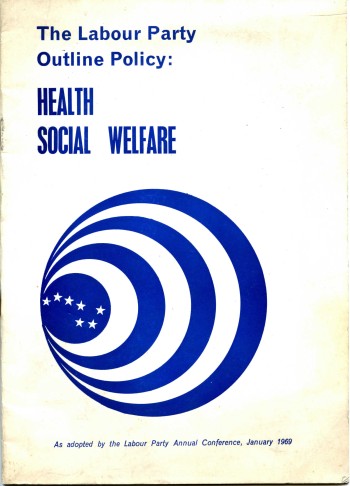
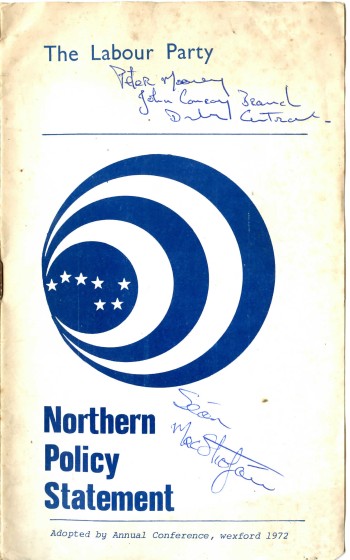
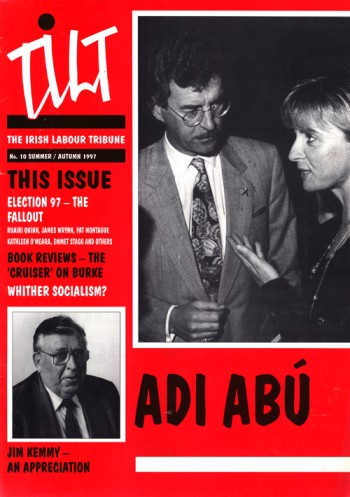
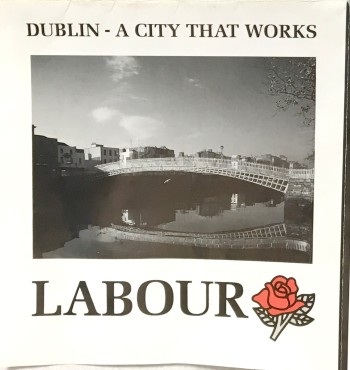
Comments
No Comments yet.
Add a Comment
Comments can be formatted in Markdown format . Use the toolbar to apply the correct syntax to your comment. The basic formats are:
**Bold text**
Bold text
_Italic text_
Italic text
[A link](http://www.example.com)
A link
You can join this discussion on The Cedar Lounge Revolution
By: WorldbyStorm Fri, 28 Mar 2008 08:52:24
Conor, that would seem to indicate that he didn’t say it in 1969 and that it long predated that. I think, disgraceful or not, that the context and the date is important here. We need to find both to make a judgement on it.
Reply on the CLR
By: NollaigO Fri, 28 Mar 2008 09:10:53
Conor:
The election was in 1969 (June?). Though I was in a university republican club at the time, I voted Labour and election night was a painful experience.
While I left Ireland in early 1970 and while return visits (mainly outside Dublin) give very partial insights, the decline in influence of the Catholic church since the 1960s is obviously enormous. So I would be charitable to Brendan Corish’s “defensive formulations” when advocating socialism. Was he a political thinker ahead of his time? Sin ceist eile.
Reply on the CLR
By: Pearse McLennan Fri, 28 Mar 2008 13:17:04
Is that Nollaig O’Gadhra?
Reply on the CLR
By: Conor McCabe Fri, 28 Mar 2008 13:28:31
There seems to have been a backlash in rural Ireland following the labour party’s move to make the 1970s socialist – in Dublin, it seems to have done them a lot of good. NollaigO I’d be thinking of the timing of the election – June 1969 – and the influence of events in the North. Could you throw any light on that for me? I mean, did FF gain from events in the north? Or was it the economy – the late 1960s being a a bit of a highwater in economic terms for Ireland. Or was it both!!
Reply on the CLR
By: Death of Wolfe Tone. Irish at Gettysburg. Labour Leader Brendan Corish at Today in Irish History | Today In Irish History Mon, 19 Nov 2012 09:10:42
[…] READ: Blog article on Brendan Corish […]
Reply on the CLR
By: Anonymous Mon, 08 Apr 2013 16:18:36
[…] It would do Labour people on here a lot of good to have a look back, even as far as 1969, The New Republic There was so much new thinking, not New Labour stuff, and new people, which eventually went […]
Reply on the CLR
By: Gettysburg Address – Death of Wolfe Tone – Labor Leader Brendan Corish | Today In Irish History Tue, 19 Nov 2013 15:24:36
[…] READ: Blog article on Brendan Corish […]
Reply on the CLR